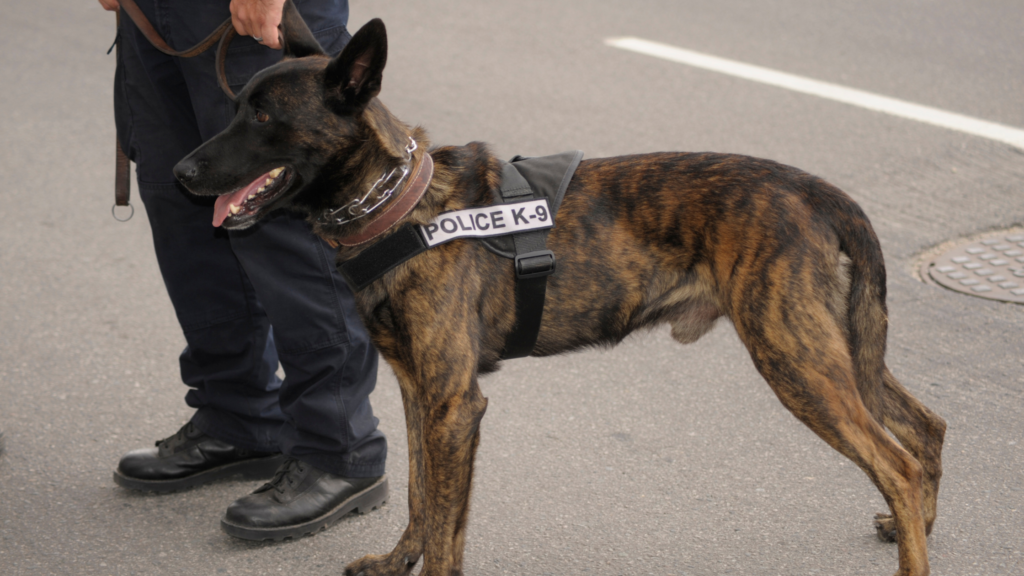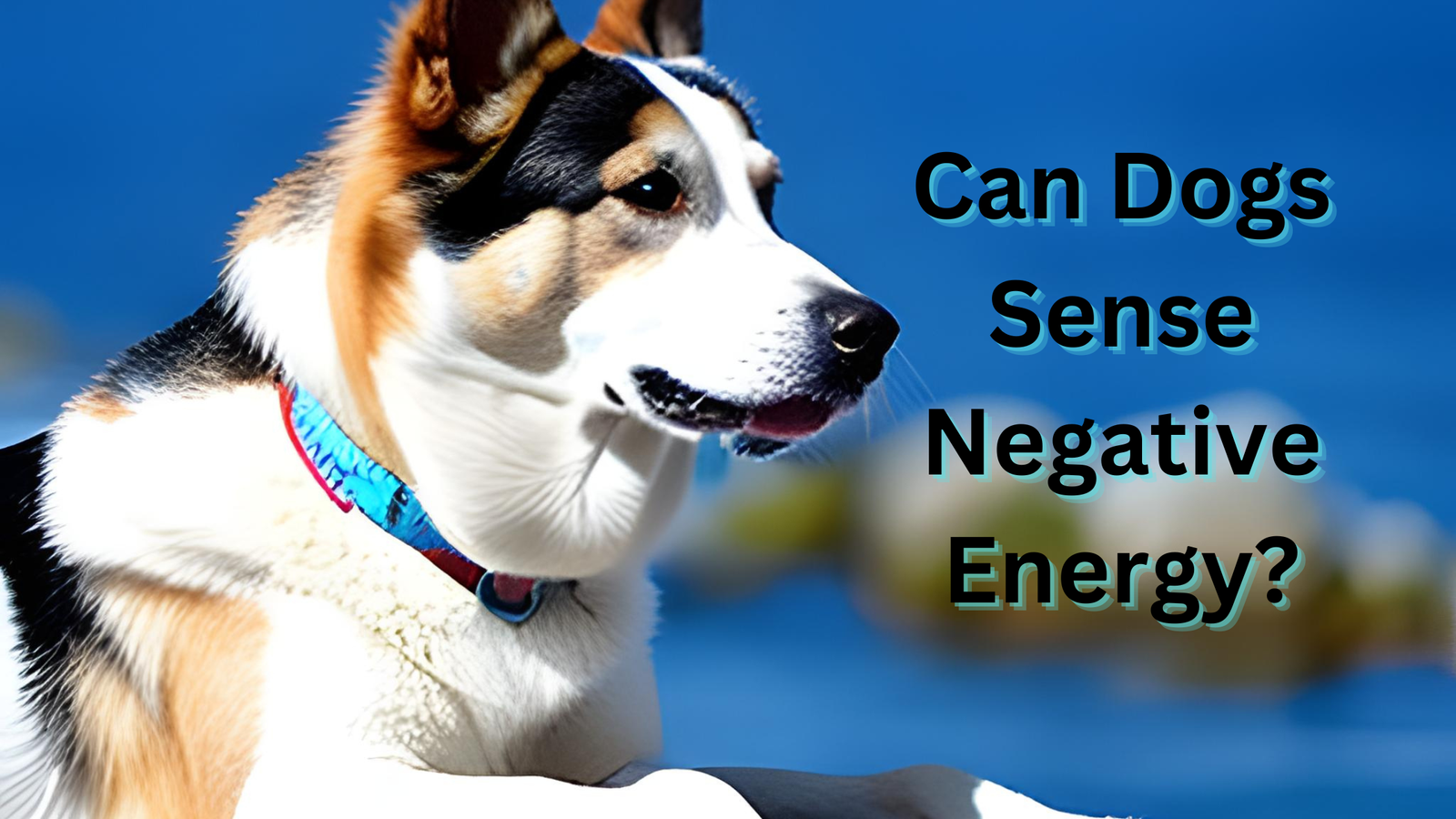Dogs have been known for their exceptional senses and remarkable abilities. They can detect drugs, track missing persons, and even predict epileptic seizures. But can dogs sense negative energy? This question has been debated among dog owners and animal behaviour experts for years. In this article, we’ll explore the fascinating topic of canine perception and behavior and investigate whether dogs can truly sense negative energy through their sixth sense.
Understanding the Canine Sixth Sense: How Dogs Perceive the World Differently

Dogs perceive the world differently than humans, and their senses are sharper than ours. The sixth canine sense refers to a dog’s ability to detect and respond to stimuli humans cannot see.
This sixth sense is based on the dog’s incredible sense of smell, acute hearing, and ability to read human body language and facial expressions.
A dog’s sense of smell is their primary sensory tool, and it’s estimated that they have around 300 million olfactory receptors in their nose, compared to our mere six million.
This means that dogs can detect scents beyond our sensory range, including the faintest smells, like a drop of blood in a large body of water.
In addition to their sense of smell, dogs have exceptional hearing that allows them to detect sounds beyond human range.
They can see it sounds up to four times quieter than humans can hear. This heightened sense of hearing is especially useful for dogs in detecting predators or prey in their environment.
Lastly, dogs can read human body language and facial expressions to understand our emotions and intentions.
They are skilled at detecting changes in our posture, tone of voice, and facial expressions, which can help them predict our behavior and respond accordingly.
Overall, dogs perceive the world through their senses in a vastly different way from humans.
Their incredible sensory abilities enable them to detect and respond to stimuli beyond our sensory range, making them valuable companions and helpers in many areas of human life.
What is Negative Energy? Defining the Concept and Its Impact on Humans and Dogs
Negative energy refers to emotions and feelings that are unpleasant, uncomfortable, or disruptive. It can be caused by stress, anxiety, fear, anger, or other negative emotions that humans and dogs may experience.
Negative energy can impact a person’s physical and mental health, as well as their overall well-being. It can also have an impact on the behavior and health of dogs.
For humans, negative energy can manifest as physical symptoms like headaches, fatigue, and muscle tension or emotional symptoms like irritability, anxiety, and depression.
Chronic exposure to negative energy can lead to more serious health problems like cardiovascular disease, diabetes, and other chronic illnesses.
For dogs, negative energy can cause behavioral changes such as increased aggression, fear, or avoidance of certain situations or people.
Dogs may also experience physical symptoms like restlessness, excessive barking, and digestive issues.
The impact of negative energy on dogs is closely linked to their relationship with their owners. Dogs are highly attuned to their owner’s emotional state.
They can pick up on negative energy, affecting their behavior and overall health. Dogs that are exposed to chronic negative energy may develop anxiety, depression, and other behavior problems.
It’s important for pet owners to be aware of their own emotional state and how it may affect their dogs.
By managing their own negative energy, pet owners can help create a positive and healthy environment for their dogs to thrive in.
How Can Dogs Sense Negative Energy? Exploring the Different Senses and Signals Involved

Dogs have a keen sense of intuition and are highly attuned to their environment, including the emotions and feelings of those around them.
They use their minds to detect negative energy in their surroundings and respond accordingly.
One of the main ways that dogs sense negative energy is through their sense of smell.
Dogs have an incredibly keen sense of smell, which allows them to detect subtle changes in the chemical composition of the air around them.
When a person is experiencing negative emotions, their body chemistry changes and this change can be detected by a dog’s sensitive nose.
In addition to their sense of smell, dogs also use their sense of hearing to detect negative energy.
They can pick up on changes in a person’s tone of voice and the cadence of their speech, which can indicate negative emotions like anger, fear, or sadness.
Dogs are also able to read human body language and facial expressions, which can give them clues about a person’s emotional state.
For example, a tense person may have a stiff posture or frown on their face, which can be read by a dog as a sign of negative energy.
Finally, dogs can sense negative energy through their intuition. Dogs are highly attuned to their owner’s emotions and can pick up on subtle changes in their behavior or mood.
They can sense when something is wrong, even if their owner is not aware of it themselves.
Overall, dogs use a combination of their senses, including smell, hearing, and intuition, to detect negative energy in their surroundings.
By paying attention to their dog’s behavior and body language, pet owners can gain insight into their own emotional state and take steps to create a positive and healthy environment for their furry friends.
Also Read: Mothers Pudding for dogs: A Nutritious and Delicious Treat
Signs that Your Dog is Sensing Negative Energy: Behavioral and Physiological Indicators
Dogs are highly sensitive animals capable of catching subtle environmental changes, including negative energy.
When a dog senses negative energy, it may exhibit a variety of behavioral and physiological indicators. These signs can vary from dog to dog, but some of the most common indicators include:
Changes in Behavior
One of the most noticeable signs that your dog is sensing negative energy is a change in their behavior. Some dogs may become more vocal, barking or whining excessively, while others may become quieter.
They may become more anxious, agitated, or nervous, or they may become more withdrawn or avoidant.
Changes in Body Language
Dogs communicate a lot through their body language, and their posture or movement changes can indicate that they are sensing negative energy.
For example, they may have their tail tucked between their legs and their ears back or avoid eye contact.
Changes in Eating and Sleeping Habits
Negative energy can also affect a dog’s eating and sleeping habits. They may lose their appetite or become pickier about their food. They may also have trouble sleeping or become more restless at night.
Physiological Changes
Negative energy can also cause physiological changes in a dog’s body. They may have an elevated heart rate, increased respiration, or even digestive issues like vomiting or diarrhea.
Sensing Negative Energy from Others
Dogs are highly attuned to their owners’ emotions and can sense negative energy from them. If you are experiencing negative emotions, your dog may become more clingy or follow you around more than usual.
Overall, suppose you notice any of these signs in your dog. In that case, it’s important to pay attention and identify the source of the negative energy.
Addressing the underlying cause can help create a positive and healthy environment for your furry friend.
The Science Behind Dogs’ Ability to Sense Negative Energy: Research and Experiments
Dogs can sense human emotions and pick up on subtle changes in our behavior, vocalizations, and body language.
While “negative energy” is difficult to measure or quantify, studies have shown that dogs are highly attuned to our emotional states.
For example, a study conducted by researchers at the University of Lincoln found that dogs could distinguish between positive and negative emotional expressions on human faces.
Another study by researchers at the University of Naples found that dogs could detect differences in the scent of sweat produced by humans experiencing fear or anxiety.
Additionally, research has shown that dogs can pick up on changes in human vocalizations, including recognizing the emotional tone of our voices.
These studies suggest that dogs are highly perceptive to our emotional cues and can sense changes in our energy and behavior.
It’s important to note that a dog’s ability to sense negative energy may be influenced by various factors, including genetics, training, and environment.
Understanding and respecting our dogs’ ability to feel our emotions can create a positive and healthy environment for our furry friends and ourselves.
Factors That Can Influence Your Dog’s Ability to Sense Negative Energy: Genetics, Training, and Environment
While all dogs have the innate ability to sense human emotions and energy, several factors can influence how well they can do so. These factors include genetics, training, and environment.
Genetics plays a role in a dog’s ability to sense negative energy. Some breeds, such as German Shepherds and Labrador Retrievers, are known for their exceptional abilities to sense changes in human emotions.
This is partly due to their genetics, as these breeds were originally bred for specific tasks such as tracking and hunting, which required a high level of sensitivity to environmental changes.
Training can also affect a dog’s ability to sense negative energy. Dogs trained to work with humans, such as therapy dogs or service dogs, are often highly attuned to their owners’ emotions and can sense when upset or stressed.
Training can help dogs learn how to respond appropriately to their owners’ emotions and provide comfort and support when needed.
The environment is another factor that can influence a dog’s ability to sense negative energy. Dogs that live in a chaotic or stressful environment may become desensitized to changes in human emotions and may need to be more responsive to their owners’ needs.
On the other hand, dogs that live in a calm and stable environment are more likely to be attuned to their owners’ emotions and able to provide support when needed.
It’s important to remember that each dog is unique and may respond differently to different factors influencing their ability to sense negative energy.
Understanding and respecting our dogs’ individual skills and needs can create a positive and healthy environment for our furry friends and ourselves.
How to Help Your Dog Cope with Negative Energy: Training, Therapy, and Support
If you suspect that your dog is sensing negative energy or if you are going through a difficult time and want to provide your dog with additional support, there are several steps you can take to help your furry friend cope with their emotions.
Training is one of the most effective ways to help your dog cope with negative energy. By teaching your dog basic obedience commands such as “sit,” “stay,” and “come,” you can help them feel more secure and confident in their environment.
Positive reinforcement training, where you reward your dog for good behavior, can also help build a stronger bond between you and your dog and improve their overall sense of well-being.
Therapy can also be beneficial for dogs that are struggling to cope with negative energy. Animal-assisted treatment, where dogs provide comfort and support to people in hospitals, nursing homes, and other settings, effectively reduces stress and anxiety in both dogs and humans.
Additionally, specialized therapy dogs are trained to work with people with specific conditions, such as post-traumatic stress disorder (PTSD) or anxiety disorders.
Support is another important factor in helping your dog cope with negative energy.
This can come in the form of social support from family and friends and professional support from veterinarians, dog trainers, and behaviorists.
Talking to your veterinarian or a professional dog trainer can help you identify strategies to help your dog cope with negative energy and provide the support they need to thrive.
Overall, by providing your dog with the right training, therapy, and support, you can help them cope with negative energy and improve their overall well-being.
By working closely with your veterinarian and other professionals, you can develop a personalized plan that meets your dog’s needs and helps them live a happy and healthy life.
It’s important to remember that every dog is unique, and what works for one dog may not work for another.
Case Studies: Real-Life Examples of Dogs Sensing Negative Energy in Humans

Countless anecdotal reports of dogs sensing negative energy in their owners and other humans.
While these reports are not scientifically proven, they offer intriguing insights into the bond between dogs and humans and their potential to sense emotions that humans may not be aware of.
One famous example of a dog sensing negative energy occurred after the 9/11 attacks in New York City. Therapy dogs were brought in to comfort rescue workers and others affected by the tragedy.
Many of these dogs demonstrated an ability to detect stress and anxiety in humans and provide them with a calming presence.
Similarly, during the COVID-19 pandemic, dogs have been used to detect the virus in humans and provide emotional support to healthcare workers and patients.
In another example, a therapy dog named Gander was able to sense a patient’s impending seizure and alert their owner to the situation.
The dog had not been specifically trained to detect attacks but could pick up on the subtle changes in the patient’s behavior and provide an early warning.
There are also many stories of dogs sensing negative energy in their owners and acting to comfort them.
For example, some dogs have been known to place a paw on their owner’s hand or arm when feeling sad or anxious.
Other dogs may become more protective of their owners when they sense they are in danger or under stress.
While these examples are not conclusive proof that dogs can sense negative energy, they offer compelling evidence that dogs have an innate ability to pick up on human emotional cues.
Further research is needed to fully understand the science behind this phenomenon.
Still, these real-life examples demonstrate the unique bond between dogs and humans and the potential for dogs to provide emotional support in times of need.
Also Read: Can Ramen Noodles Kill Dogs? What Pet Owners Need to Know
Conclusion: Do Dogs Really Sense Negative Energy? The Complexities of Canine Perception and Behavior.
The question of whether dogs can sense negative energy is a complex one that is still being explored by scientists and animal behavior experts.
While there is anecdotal evidence to suggest that dogs can pick up on emotional cues from humans and respond to them in various ways, there is still much we still need to learn about the precise mechanisms involved.
We know that dogs are highly attuned to their environment and have remarkable sensory abilities that allow them to detect subtle changes in sound, scent, and behavior.
They are also highly responsive to human emotions. They can become anxious or agitated when their owners are upset or stressed.
The ability of dogs to sense negative energy may be related to their heightened sensitivity to these environmental and emotional cues.
It may also be influenced by genetics, training, and socialization, which can shape their perception and behavior.
Despite the uncertainties surrounding the science of canine perception, the bond between dogs and humans is undeniable.
Whether dogs truly sense negative energy or not, there is no denying that they can provide emotional support and comfort to their owners in times of need.
As we continue to explore the mysteries of canine behavior and perception, it is clear that the human-dog relationship is complex and fascinating and deserves further study and appreciation.
